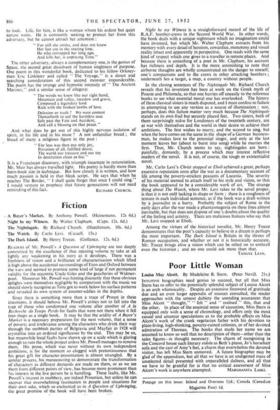Poor Little Woman
Louisa May Alcott. By Madeleine B. Stern. (Peter Nevill. 21s.) INTurnvE biographies need genius to succeed, but all that Miss Stern has to offer to the potentially splendid subject of Louisa Alcott is an arch whimsicality. Despite an extensive foreword of gratitude due and an even larger appendix of sources consulted, the reader approaches with the utmost dubiety the unending assurances that Miss Alcott " thought," " felt " and " realised " this, that and the other. In place of the essential sense of causation, Miss Stern is equipped only with a sense of chronology, and offers only the most casual' and amateur speculations as to the probable effects on Miss Alcott's work of the crank vegetarian father with his devotion to plain-living, high-thinking, poverty-ruined colonies, or of her devoted admiration of Thoreau. The books that made her name we are assumed to know so well that no description of them—other than the sales figures—is thought necessary. The charm of recognising in the Concord house such literary eidola as Beth's piano, Jo's horsehair sofa and the cast of Amy's feet, a charm that overwhelms the devoted visitor, has left Miss Stern unmoved. A future biographer may be glad of the appendices, but all that we have is an undigested mass. of unelected detail presented with unparalleled dulness, and all that we have to be grateful for is that no critical assessment of Miss Alcott's work is anywhere attempted. MARGHANITA LASKI:


































 Previous page
Previous page